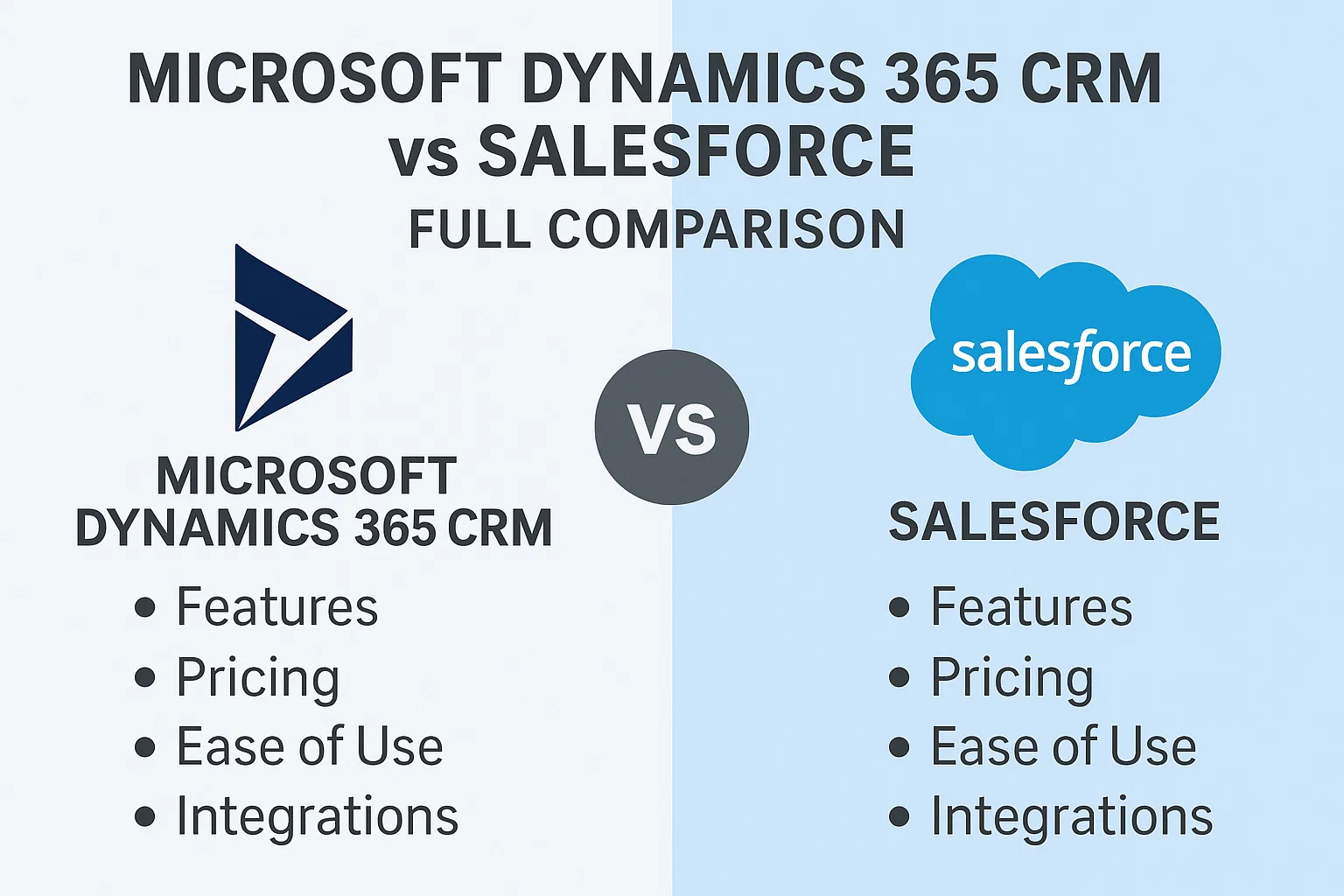Microsoft Dynamics 365 CRM vs Salesforce: Full Comparison

Microsoft Dynamics 365 CRM vs Salesforce: Full Comparison (2025)
Choosing the right enterprise CRM in 2025 is one of the most important decisions for businesses investing in digital transformation. Two of the biggest players in the CRM SaaS market are Microsoft Dynamics 365 CRM and Salesforce. Both platforms dominate Tier 1 markets like the US, UK, Canada, and Australia, and are highly regarded for their scalability, ROI, and advanced integrations.
1. Introduction
CRM adoption continues to grow at double-digit rates. According to Gartner, the global CRM software market will cross $100 billion by 2026, with Salesforce and Microsoft Dynamics controlling the lion’s share. But which CRM offers better value in terms of pricing, ROI, AI capabilities, and compliance?
2. Market Overview
Salesforce remains the leader with strong dominance in cloud CRM and AI-powered customer engagement. Microsoft Dynamics 365 CRM, on the other hand, leverages the vast Microsoft ecosystem, providing seamless integration with Office 365, Teams, and Azure.
| Feature | Microsoft Dynamics 365 CRM | Salesforce CRM |
|---|---|---|
| Market Share (2025) | ~15% | ~23% |
| Deployment | Cloud + On-Premise | Cloud-Only |
| AI Capabilities | Copilot AI (Powered by Azure) | Einstein AI |
| Integrations | Office 365, Teams, LinkedIn | AppExchange (4,000+ apps) |
| Best For | Enterprises already on Microsoft stack | Businesses needing deep customization |
3. Pricing Comparison
Pricing is a critical factor for companies in Tier 1 countries where labor and SaaS costs are significant. Let’s compare subscription models:
| Plan | Dynamics 365 CRM | Salesforce CRM |
|---|---|---|
| Basic | $65/user/month | $75/user/month |
| Enterprise | $95/user/month | $150/user/month |
| Advanced AI & Analytics | $135/user/month | $175/user/month |
4. ROI & TCO (Total Cost of Ownership)
When evaluating ROI, businesses must consider not just the monthly subscription, but also implementation, integration, training, and support costs. Salesforce often results in higher Total Cost of Ownership, while Dynamics 365 offers better bundled pricing for enterprises already using Microsoft products.
5. AI & Automation Features
AI is redefining CRM usage in 2025:
- Salesforce Einstein AI: Advanced predictive analytics, lead scoring, customer insights.
- Dynamics 365 Copilot AI: Real-time sales forecasting, personalized customer engagement, natural language queries.
6. Security & Compliance
Both CRMs meet strict compliance standards such as GDPR, HIPAA, and SOC 2. However, Microsoft Dynamics CRM offers a stronger pitch in regulated industries like healthcare, finance, and government due to its hybrid deployment options.
7. Industry Use Cases
- Healthcare: HIPAA-compliant patient data management (Dynamics preferred).
- E-commerce: Personalized marketing automation (Salesforce preferred).
- Financial Services: Strong compliance with auditing and reporting features.
- Manufacturing: IoT and ERP integrations (Dynamics has advantage).
8. Integration Ecosystem
Salesforce’s AppExchange remains the largest CRM marketplace, while Dynamics 365 shines with native Microsoft ecosystem integration (Teams, Outlook, Power BI, Azure). The choice depends on whether your enterprise prefers breadth of apps vs depth of Microsoft stack.
9. Pros & Cons
| Dynamics 365 CRM | Salesforce CRM | |
|---|---|---|
| Pros | Strong Microsoft integration, hybrid deployment, cost-effective | Extensive ecosystem, AI leadership, best for customization |
| Cons | Learning curve for non-Microsoft users | Higher TCO, complex pricing |
10. Final Verdict: Which CRM Should You Choose?
If your business relies heavily on Microsoft Office 365, Teams, or Azure, Dynamics 365 CRM is often the best long-term ROI choice. However, if you prioritize deep customization, AI-driven sales forecasting, and large app ecosystem, Salesforce CRM remains the global leader.
11. Conclusion
There is no one-size-fits-all answer to the Microsoft CRM vs Salesforce debate. Enterprises should evaluate pricing, compliance, scalability, AI readiness, and existing IT investments before choosing. Both platforms are among the most profitable SaaS investments in 2025, ensuring high ROI if implemented strategically.
Pro Tip: Always calculate the 3-year TCO (Total Cost of Ownership) before finalizing your CRM contract to avoid unexpected costs.
Comments (3)